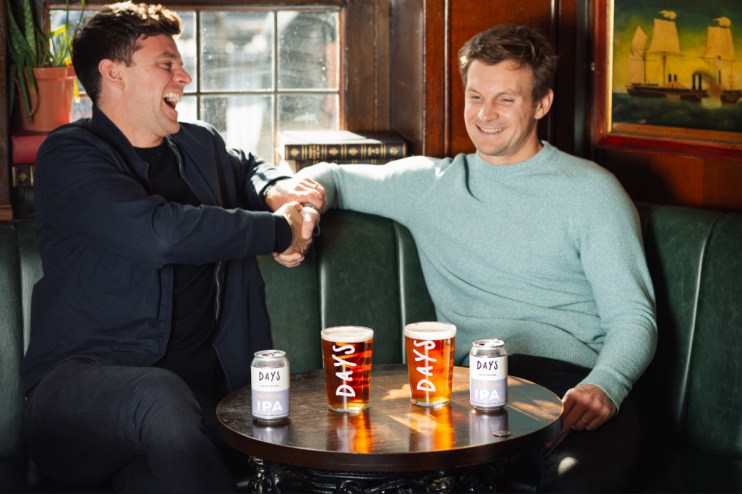Why Dry January is just another month for this alcohol-free beer brand

Highlighting a year of growth, we take a look at some of the biggest and most recent achievements of the rapidly-growing alcohol-free beer brand, Days Brewing.
Two friends, one pandemic and a few cold (alcohol-free) beers later – a long-lasting business was created.
In 2020, former AB InBev man Mike Gammell and ex-Propercorn marketing chief Duncan Keith founded alcohol-free beer brand, Days Brewing.
Needless to say, it hit the ground running. When we first spoke to the team at the start of last year, they said the year 2023 saw the company sell more than a million of its lager and pale ale lines.
Today, the lively pair tells us the brand sold more beer in 2024 than it did in its first three years combined.
Days’ most recent growth could be due to a number of achievements, such as its official debut in some of the UK’s largest supermarkets, including Tesco, Sainsbury’s, Waitrose, Ocado and Majestic.
The brand also recently launched in Stonegate, one of the UK’s largest pub groups, across 1,500 of its sites.
At the end of the day, however, it seems the real driver of growth has derived from a combination of ever-changing consumer trends and, of course, the right kind of brand positioning.
More than a Dry January trend
You could say Dry January means boom-time for brewers of non-alcoholic beer. But for Gammell and Keith, it’s just another month in the grand scheme of things.
“There’s no question that January is an exciting time for the category as lots of consumers look to make positive lifestyle decisions in the New Year,” Gammell says.
He adds: “[But] our aim is to encourage consumers to enjoy moderation all year, not just in January.
“We will continue to build momentum through investing in marketing campaigns throughout the year that celebrate the benefits of drinking less alcohol and living a healthier lifestyle.”
Indeed, the month still stands as a prime opportunity to gain brand recognition.
Regardless of it being seen as a time in which avid pub-goers look to kickstart a healthier year ahead, the trend of drinking less alcohol year-round has only continued to grow.
The global market size for “no and low” alcohol drinks is now valued at some $13bn (£10.5bn), and counting.
Consumer trends
You’d be forgiven for assuming that the trend is one that has predominantly flourished among the younger generations, such as Gen Z or Millenial.
However, the team at Days is confident that it’s a “movement” for everyone – regardless of age.
Health is the main motivator for drinking less alcohol and physical [and] mental wellness is clearly a trend that is impacting on all age groups.
“Health is the main motivator for drinking less alcohol and physical [and] mental wellness is clearly a trend that is impacting on all age groups,” Gammell says.
“As the biggest beer brand on TikTok we see high engagement with the Millennial and Gen Z demographic but when it comes to purchasing, Days is just as popular with beer drinkers across the generations.”
The future of socialising, Gammell says, is also one to watch closely: “we’re excited to see the way in which pubs and bars continue to evolve.”
“Consumers are socialising differently,” he adds, emphasising that Days has noticed a trend in earlier outings as well as the mix of alcoholic and alcohol-free products.
“The rise of social occasions where alcohol is no longer the focus is something that will continue to shape the adult drinks industry.”
Brand positioning
With nearly 52,000 followers on Tiktok and 27,000 followers on Instagram, the digital storefront that is social media has been a win for Days.
“This digital first approach gives us a uniquely close relationship with our consumers who we speak to on a daily basis,” Gammell says.
“That closeness and direct feedback loop has impacted on everything from marketing content through to new beer styles and the way we launch with our hospitality partners.”
The brand’s witty personality has also ensured that its core message is one that does not restrict or restrain. Especially since some 80 per cent of its customers still drink alcohol.
“We’ve always felt that advocating moderation as opposed to total abstinence is more inclusive,” Gammell adds.
“We also believe that serious words like ‘abstinence’ focus more on what you’re giving up as opposed to what you’re gaining and we’ve always wanted to be a brand that celebrates great beer, living a healthy lifestyle and making the most of your time.”